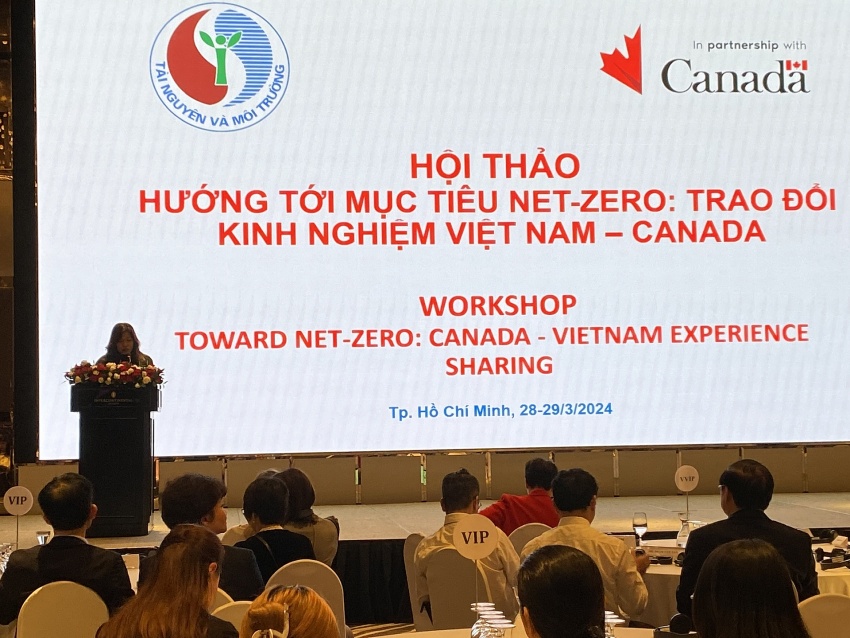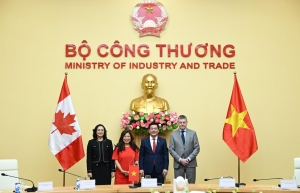Vietnam and Canada share opportunities to achieve net zero
 |
Organised by the Embassy of Canada in Vietnam and the Consulate General of Canada in Ho Chi Minh City, in collaboration with the Ministry of Natural Resources and Environment, the workshop was held on the margins of the Team Canada Trade Mission to Vietnam led by Canada’s minister of export promotion, international trade, and economic development Mary Ng.
Speaking at the workshop, Ng highly appreciated Vietnam's efforts in the journey towards net zero emissions.
| As a comprehensive partner, Canada is committed to accompanying and supporting Vietnam in the transition to a circular economy, as well as being willing to share knowledge and experience on climate change, energy, renewables, and carbon management, thereby further deepening bilateral relations. |
"Both countries aim to promote connections between relevant agencies and businesses, enhancing common interests in greenhouse emissions management, carbon markets, and technological innovations such as carbon capture and utilisation, a promising direction for bilateral cooperation," she added.
Le Cong Thanh, Vice Minister of Natural Resources and Environment, emphasied that green development, energy conversion, and emission reduction have become inevitable and irreversible trends globally.
“The Vietnamese government is making great efforts to both develop the economy and ensure the implementation of commitments and responsible contributions to climate change with the international community. Vietnam's National Climate Change Strategy up to 2050 identifies strong greenhouse gas emission reduction measures with specific goals and roadmaps to achieve net zero emissions by 2050,” Thanh said.
He added that to realise these goals, Vietnam has taken action throughout its political, economic, and social system, including adjusting the National Power Development Plan and promoting the application of management, technology, equipment, and economic energy use to reduce production costs, increase efficiency, and cut greenhouse gas emissions.
Along with this, ministries, branches and localities in Vietnam have been researching and using new energy sources such as solar, wind, hydropower, geothermal, biomass, and green hydrogen.
More importantly, all economic sectors have begun to manage, exploit, and use resources economically and effectively, minimising waste and making the most of opportunities to apply circular economic models.
“The green transition process includes energy conversion, eliminating the use of fossil fuels, and developing renewable energy, but will never become a reality without widespread cooperation,” Thanh said.
“Vietnam looks forward to continuing to cooperate intensively with Canada in energy transition efforts, eliminating fossil fuels, raising renewable energy targets, and enhancing the country's adaptability and resilience for entire society and economy, ensuring an effective green transition that is most beneficial for people and all organisations, partners and countries,” Thanh cited.
At the workshop, delegates discussed many important contents including climate change policy and Vietnam's commitment to net zero emissions, an overview of Canada's ecosystems, plans and actions towards net-zero emissions, legislation on carbon management in some Canadian localities, Canada's Net Zero Emissions Responsibility Act and tracking progress on emissions reductions, and the role of specialised organisations in climate governance.
At the 26th Conference of the Parties to the United Nations Framework Convention on Climate Change (COP26), Vietnam outlined its goal of achieving net zero emissions by 2050.
Vietnam and Canada established diplomatic relations in 1973, culminating in the establishment of a Comprehensive Partnership in November 2017.
The partnership focuses on politics, trade, development, defence, culture, science, and people-to-people exchanges, marks a significant milestone in bilateral relations, showcasing the leaders’ vision for elevated ties and extensive cooperation.
Canada’s commitment to support Vietnam’s transition to a circular economy and sustainable development, as well as its willingness to share knowledge and experiences in climate change mitigation, renewable energy, and carbon management, underscores the depth of collaboration.
Both countries aim to foster connections between relevant agencies and businesses, leveraging mutual interests in greenhouse gas emission management, carbon markets, and technological innovations such as carbon capture and utilisation, signalling a promising avenue for bilateral cooperation.
 | Canada eager to hike interest across Vietnam Vietnam has been extensively expanding its trade and investment ties with Canada while taking the advantage of the Comprehensive and Progressive Agreement for Trans-Pacific Partnership as a big leverage. |
 | Canada favours Vietnam market A delegation of nearly 200 Canadian businesses is visiting Vietnam from March 26 to 29 to boost trade and investment. |
What the stars mean:
★ Poor ★ ★ Promising ★★★ Good ★★★★ Very good ★★★★★ Exceptional
Related Contents
Latest News
More News
- Bac Ai Pumped Storage Hydropower Plant to enter peak construction phase (January 27, 2026 | 08:00)
- ASEAN could scale up sustainable aviation fuel by 2050 (January 24, 2026 | 10:19)
- 64,000 hectares of sea allocated for offshore wind surveys (January 22, 2026 | 20:23)
- EVN secures financing for Quang Trach II LNG power plant (January 17, 2026 | 15:55)
- PC1 teams up with DENZAI on regional wind projects (January 16, 2026 | 21:18)
- Innovation and ESG practices drive green transition in the digital era (January 16, 2026 | 16:51)
- Bac Ai hydropower works stay on track despite holiday period (January 16, 2026 | 16:19)
- Fugro extends MoU with PTSC G&S to support offshore wind growth (January 14, 2026 | 15:59)
- Pacifico Energy starts commercial operations at Sunpro Wind Farm in Mekong Delta (January 12, 2026 | 14:01)
- Honda launches electric two-wheeler, expands charging infrastructure (January 12, 2026 | 14:00)

 Tag:
Tag:
















 Mobile Version
Mobile Version